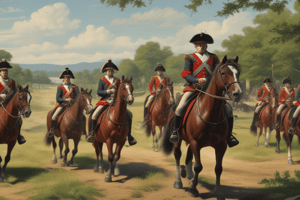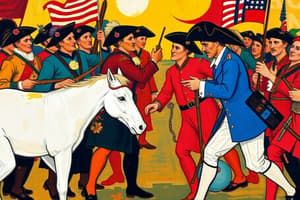Podcast
Questions and Answers
What was the goal of the 1st Continental Congress?
What was the goal of the 1st Continental Congress?
Not to separate from Britain, but rather to state their concerns and come to a resolution.
What was the purpose of Paul Revere's Midnight Ride?
What was the purpose of Paul Revere's Midnight Ride?
To warn colonists of British intent to seize a stockpile of weapons.
Which event occurred during the American Revolution?
Which event occurred during the American Revolution?
- 1st Continental Congress meets
- Bunker Hill (correct)
- Lexington & Concord (correct)
- Midnight Ride
- 2nd Continental Congress
What strategic move did Washington make to force the British to leave Boston?
What strategic move did Washington make to force the British to leave Boston?
Who wrote the pamphlet "Common Sense"?
Who wrote the pamphlet "Common Sense"?
What were the key achievements of the 2nd Continental Congress?
What were the key achievements of the 2nd Continental Congress?
What document was a last attempt to make peace with Great Britain?
What document was a last attempt to make peace with Great Britain?
What was the goal of Thomas Paine's writings?
What was the goal of Thomas Paine's writings?
Which battle was a turning point in the Revolutionary War?
Which battle was a turning point in the Revolutionary War?
The Battle of Bunker Hill took place during the Revolutionary War.
The Battle of Bunker Hill took place during the Revolutionary War.
What key argument did Thomas Jefferson make in the Declaration of Independence?
What key argument did Thomas Jefferson make in the Declaration of Independence?
Who wrote the Declaration of Independence ?
Who wrote the Declaration of Independence ?
Who were the groups that were mostly left out of the principles of the Declaration of Independence?
Who were the groups that were mostly left out of the principles of the Declaration of Independence?
What factors contributed to the American victory in the Revolutionary War?
What factors contributed to the American victory in the Revolutionary War?
Who is known for disguising herself as a man to serve in the Continental Army?
Who is known for disguising herself as a man to serve in the Continental Army?
What was one of the major challenges faced by the Continental Army?
What was one of the major challenges faced by the Continental Army?
What is the basis for the concept of inalienable rights?
What is the basis for the concept of inalienable rights?
What types of materials were used to record early American history?
What types of materials were used to record early American history?
Who delivered the famous speech, "Give me liberty, or give me death!" ?
Who delivered the famous speech, "Give me liberty, or give me death!" ?
What was the significance of Lord Dunmore's Proclamation?
What was the significance of Lord Dunmore's Proclamation?
Who were the Hessians?
Who were the Hessians?
What major battle was a decisive victory for the Continental Army?
What major battle was a decisive victory for the Continental Army?
What key event led to the British evacuation of Boston?
What key event led to the British evacuation of Boston?
What major battle caused significant losses for the Continental Army?
What major battle caused significant losses for the Continental Army?
What action by Lord Dunmore contributed to the Black Loyalists?
What action by Lord Dunmore contributed to the Black Loyalists?
What was a significant turning point in the Revolutionary War which forced the Continental Army to endure harsh conditions?
What was a significant turning point in the Revolutionary War which forced the Continental Army to endure harsh conditions?
Who was a French nobleman who aided the Continental Army?
Who was a French nobleman who aided the Continental Army?
Which battle was a crucial defeat for General Gates and the Americans?
Which battle was a crucial defeat for General Gates and the Americans?
Who commanded a guerilla force, utilizing hit-and-run tactics against the British?
Who commanded a guerilla force, utilizing hit-and-run tactics against the British?
What was the final major battle of the Revolutionary War?
What was the final major battle of the Revolutionary War?
How can students learn about the strengths and weaknesses of each side in the Revolutionary War?
How can students learn about the strengths and weaknesses of each side in the Revolutionary War?
What is essential when answering questions about the Revolutionary War?
What is essential when answering questions about the Revolutionary War?
Flashcards
1st Continental Congress
1st Continental Congress
The first gathering of colonial representatives to discuss concerns with British rule. They sent the Olive Branch Petition to King George III.
Midnight Ride
Midnight Ride
The famous ride of Paul Revere through the night to warn colonists of the approaching British troops. This helped spark the start of the Revolutionary War.
Battle of Bunker Hill
Battle of Bunker Hill
The first major battle of the Revolutionary War, held in Massachusetts. It was a costly victory for the colonists, but it proved their determination to fight against British rule.
Common Sense
Common Sense
Signup and view all the flashcards
2nd Continental Congress
2nd Continental Congress
Signup and view all the flashcards
Olive Branch Petition
Olive Branch Petition
Signup and view all the flashcards
George Washington
George Washington
Signup and view all the flashcards
Declaration of Independence
Declaration of Independence
Signup and view all the flashcards
Unalienable Rights
Unalienable Rights
Signup and view all the flashcards
Social Contract
Social Contract
Signup and view all the flashcards
Valley Forge
Valley Forge
Signup and view all the flashcards
Franco-American Alliance
Franco-American Alliance
Signup and view all the flashcards
Battle of Camden
Battle of Camden
Signup and view all the flashcards
Marion's Brigade
Marion's Brigade
Signup and view all the flashcards
Battle of Yorktown
Battle of Yorktown
Signup and view all the flashcards
British Military Strategy
British Military Strategy
Signup and view all the flashcards
Colonial Military Strategy
Colonial Military Strategy
Signup and view all the flashcards
Patriotism
Patriotism
Signup and view all the flashcards
Loyalists
Loyalists
Signup and view all the flashcards
Right of Revolution
Right of Revolution
Signup and view all the flashcards
Hessians
Hessians
Signup and view all the flashcards
Marquis de Lafayette
Marquis de Lafayette
Signup and view all the flashcards
Battle of Trenton
Battle of Trenton
Signup and view all the flashcards
Siege of Boston
Siege of Boston
Signup and view all the flashcards
Battle of New York
Battle of New York
Signup and view all the flashcards
Lord Dunmore's Proclamation
Lord Dunmore's Proclamation
Signup and view all the flashcards
Valley Forge
Valley Forge
Signup and view all the flashcards
Deborah Sampson
Deborah Sampson
Signup and view all the flashcards
Disease
Disease
Signup and view all the flashcards
Revolutionary Literature
Revolutionary Literature
Signup and view all the flashcards
Women's Role in the Revolution
Women's Role in the Revolution
Signup and view all the flashcards
Give Me Liberty or Give Me Death
Give Me Liberty or Give Me Death
Signup and view all the flashcards
Strengths and Weaknesses of Each Side
Strengths and Weaknesses of Each Side
Signup and view all the flashcards
Significance of the American Revolution
Significance of the American Revolution
Signup and view all the flashcards
Impact of the Revolution on Native Americans
Impact of the Revolution on Native Americans
Signup and view all the flashcards
Study Notes
Unit 4 Study Guide
- Colonists sought resolution with Britain, not separation
- British intended to seize a stockpile of weapons
- 1st Continental Congress, Midnight Ride, Lexington & Concord, 2nd Continental Congress, Bunker Hill are significant events
- Washington moved his army to Dorchester Heights and positioned cannons on Nook's Hill
- "Common Sense" by Thomas Paine influenced colonists
- A Continental Army was created, and Washington was chosen to lead it
- The Olive Branch Petition was created and sent to Great Britain
- Colonists were encouraged to reject loyalty to the British king
- The Battle of Bunker Hill was a key battle
- The Revolutionary War was a defining period
- Natural rights, including life, liberty, and the pursuit of happiness, were declared.
- King George III violated colonists' rights by imposing taxes without consent
- King George III broke the social contract, giving colonists the right to self-govern
- Thomas Jefferson played a vital role
- Women, Native Americans, and enslaved Africans were affected by the war in various ways
- Support was received from overseas
- Patriotism and a willingness to die for freedom were prevalent
- An example of a soldier's experience is highlighted, as evident by a woman receiving an honorable discharge despite concealing her gender to assume a position of army orderly
- Disease was a significant factor during the war
- Rights were granted by natural law
- Examples of historical writing are important (poems, plays, historical narratives)
- Patrick Henry and Lord Dunmore's Proclamation were significant events
- German mercenaries were employed by Britain against the Americans
- The Battle of Trenton, the Siege of Boston, and the Battle of New York were crucial battles
- Colonists sought help from allies across the world
- Washington was an influential leader
- Valley Forge was a significant winter camp
- Marquis de Lafayette assisted the colonists
- The Battle of Camden was a conflict
- Marion's Brigade played a role in the war
- The Battle of Yorktown was a final significant battle
- The strengths and weaknesses of each side are to be considered in study notes
Studying That Suits You
Use AI to generate personalized quizzes and flashcards to suit your learning preferences.
Related Documents
Description
Explore the crucial events and concepts of the American Revolution in this comprehensive study guide for Unit 4. Learn about key figures like Thomas Paine and Thomas Jefferson, significant battles, and the impact of colonial sentiments towards independence from Britain. This guide encapsulates the struggle for natural rights and self-governance leading up to the Revolutionary War.




